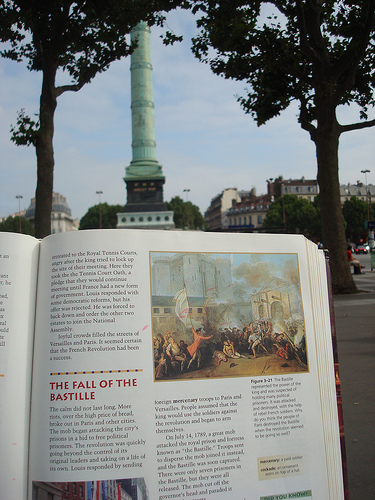 With my ears still ringing from one of our program’s cultural outings, this one a benefit concert put on by local bands – including TALONS ’09 alumni Jeff Huggins’ band the Knots – at Centennial Secondary, organized by grade ten student, Kiko, I am compelled to report on a few highlights in the class’ interview solicitation. Textbook research drawing to a close, a few of our students are finding success in accessing primary source information through email, and as of this evening, their blogs.
With my ears still ringing from one of our program’s cultural outings, this one a benefit concert put on by local bands – including TALONS ’09 alumni Jeff Huggins’ band the Knots – at Centennial Secondary, organized by grade ten student, Kiko, I am compelled to report on a few highlights in the class’ interview solicitation. Textbook research drawing to a close, a few of our students are finding success in accessing primary source information through email, and as of this evening, their blogs.
Andrea reports that “this year is so much better than last year,” as she:
… first started by e-mailing the Corrie ten Boom museum in Holland to get the dimensions of the Hiding Place where she concealed the Jewish people in her home. Because I am an english speaker and wrote my question in english they redirected my email to Emily Smith in San Diego who volunteer at the museum in the summer and wrote the book “A visit to the Hiding Place-The life changing experiences of Corrie ten Boom.” This book that she wrote is only available online, but Emily Smith gave me her personal address to send the money order to because she check her work mail only twice a month. I ordered the book to help me with my project and I got it a week ago and it is filled with many pictures and personal items which I could not find anywhere else.
There were, as ever, other complications:
Last week I also realized that I need to serve Corrie ten Boom’s favourite food at the Night of the Notables and none of her books mention anything about what she enjoyed eating I decided to email Emily Smith again. The next day I received a reply not only mentioning her two favourite foods but with links to recipes I can use to make them.
Elsewhere, Ariana – who tonight learned for the first time about Alice Cooper via one of the performer’s T-Shirts – has been rewarded for her effort in researching Frida Kahlo:
On Sunday, I sent off e-mails to the curators of seven different art galleries with works by Kahlo. Yesterday I came home to three replies in my inbox! One of these, from the Phoenix Art Museum, was more than a page long and included quotes and links. Last year, for the same project (I studied Petra Kelly), I only received one response three weeks or so after I e-mailed my questions.
In an experiential variation on my previous post on obtaining interviews, she offers this advice:
- Show that you spent time and effort on your e-mail. If you do this people are more likely to spend time and effort on their reply back.
- Explain about yourself and the project you are undertaking. (I think half the reason I got such a long reply back from the Phoenix Art Museum was because the curator grew up in Victoria.)
- Demonstrate that you researched your topic well before coming to others for supplementary information. This way, it doesn’t appear that you are asking questions with answers easily available online or at the library.
And then this evening, whist passing one of the gear-changes on stage with a quick checking of my phone’s Google Reader, I found this comment left on Donya’s blog, a testament to the power of a functioning digital network. Responding to a Tweet I sent out last night, Mr. Blair Miller of Surrey’s Frank Hurt had come across my request and jumped into action:
Hi,
I had a tweet from Mr. Jackson on Twitter regarding your interest in information on famous blind/deaf artists. There are a number of blind and deaf artists, but the art world is a difficult one to gain fame in. One thing that you might consider for your project is looking instead at disabled artists more generally and think about the conditions that disabled artists work under.
Mr. Miller – whose response continues for another four paragraphs with questions to consider, as well as supplemental links that are invaluable resources – should know that he has contributed to this process greatly already, as I arrived home tonight to see that Donya had posted a tweet referring to a possible change of perspective in her upcoming address to the class – abandoning the potentially rich narrative voice of Mark Twain, and taking another look at the influence of Hellen Keller, one inspired by Blair’s comment.
At the conclusion of the project, students are encouraged to write thank you notes to their interview subjects and mentors throughout the process. This year I am happy to see that this could entail a lot of notes. Thanks to those out there helping us along so far!
2 thoughts on “The Interviews Take Flight”
Comments are closed.